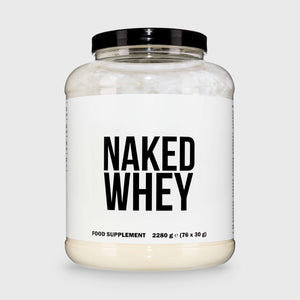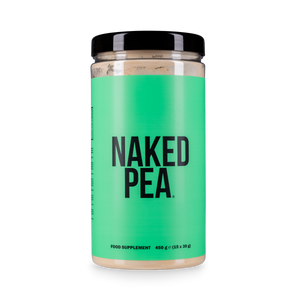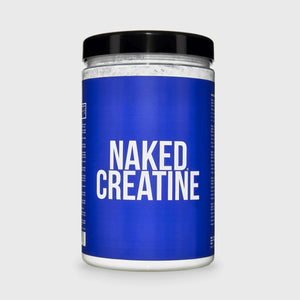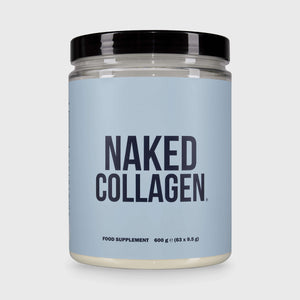Collagen is a highly popular health and beauty nutrition supplement. Most people know, have heard of, or even take collagen supplements daily.
There are tons of brands that make collagen supplements in various forms, from liquids, gummies, gels, capsules, powders, and tablets, and you can find them at most drug stores or even your local grocery chain.
Most of these products vary in their collagen source and dosage. So, how do you know if collagen is right for you and how much you should be taking? Let’s take a deeper look.
Why Collagen Is Essential for Your Body
Collagen is a vital protein that plays a role in several body functions. While not everyone needs supplemental collagen, it can provide many benefits.
What Is Collagen, and Why Does Your Body Need It?

Collagen is an abundant protein found in humans and animals. It’s a structural protein that comprises the framework of your skin, muscles, tendons, and ligaments [1].
It is made from 3 different amino acids, glycine, proline, and hydroxyproline, which form a triple-helix structure [2, 3].
As you get older, typically around 20 to 30 years of age or later, your body’s collagen production begins to slow. This causes alterations in your tissues' integrity and moisture retention, which can contribute to visible signs of aging, such as wrinkles, fine lines, and decreased skin elasticity [3].
While collagen is mainly known for its effects on our skin, it is also important for many cellular processes, including tissue repair and maintenance, as well as our immune system response.
Types of Collagen and Their Specific Benefits (Types I, II, III)
While there are nearly 30 different types of collagen, most of the collagen found in the human body is type I, which makes up about 90%; however, types II and III are also very common [2].
Each type of collagen plays a different role in the body. For example, type I collagen is mainly found in our skin, connective tissue, and ligaments to provide structure, while type II collagen is found primarily in our cartilage, and type III is found more in our muscle tissue, arteries, and organs [4].
This is helpful to know if you want to take collagen supplements, as it may determine which type is better suited for your needs.
If you want a collagen supplement to help aid in reducing fine lines and wrinkles, a type I collagen source is likely going to be your best option, while those looking to improve joint pain may benefit more from a type II source of collagen.
Most supplements provide a mixture of types. For example, bovine collagen contains more type I and III collagen, making it better for skin, whereas marine collagen has more type I and II collagen, which may be better for joints [5, 6].
Recommended Collagen Dosage Based on Science
If you are toying with the idea of taking collagen supplements, it may feel overwhelming to navigate the many different options available. Not only are there different collagen sources, types, brands, and forms of supplements, but many of them have largely varying dosages. So, what does the research say?
There are currently no official guidelines for recommended collagen dosage, and the amount of collagen recommended will vary depending on the form. Most collagen supplements can be found in hydrolyzed, denatured, or gelatin form.
Hydrolyzed collagen, which is the most common, is found to be both safe and effective at dosages of as little as 2.5 grams to 15 grams or more, depending on what you are using it for [7].
Remember that collagen is a protein. This is why it’s not such a concern for most healthy adults to have higher doses; however, excessive intake can still cause issues.
Collagen Dosage for Skin & Hair Health

Most research studies support dosages of as little as 2.5 grams per day of hydrolyzed collagen for skin health and hydration. Studies have extended to doses as high as 15 grams with benefits, but no research supports higher doses to be more effective for skin health. Higher doses are more catered towards improvements in body composition over skin integrity but could provide benefits to both [8].
Collagen Dosage for Joint & Bone Health
Like taking collagen for skin, smaller doses of 2.5 grams per day may provide benefits for joint health. Increasing the dose slightly, to about 5 grams per day, may provide greater benefit, particularly when it comes to bone health. It’s important to note that most of the studies on this were conducted on women in menopause or perimenopause with osteopenia (bone density loss) [9, 10].
Collagen Dosage for Muscle Recovery & Performance

Because collagen is a type of protein, higher amounts can provide muscle recovery post-exercise. Around 15-20 grams within 1 hour before or after a workout is recommended.
This is only impactful if you are also eating a high-protein diet to ensure you are providing your muscles with all the essential amino acids to help rebuild and recover.
Best Time to Take Collagen – Morning vs. Night, With or Without Food
The best time to take collagen supplements depends on why you are taking them. Collagen supplements tend to be most beneficial when taken on an empty stomach, either in the morning, right before bed, or an hour before or after weight training.
If you are taking collagen for your skin, taking it first thing in the morning before breakfast may be the best time for you to boost absorption [11, 12].
Some smaller studies have found that taking collagen supplements at night may help improve sleep quality. More studies on this are needed, but it’s not likely to be negatively impactful [13].
Those who are including collagen supplements to aid in muscle growth and recovery will find it more beneficial to take these within an hour before or after exercise to give your body that easily digestible protein directly to your muscle tissue [14].
Factors That Affect How Much Collagen You Need

Diet, lifestyle, and age all play a factor in how much collagen you need. Bear in mind that not everyone needs a collagen supplement, but those who fall into the below categories may benefit more from taking one than someone who doesn’t.
Age and Natural Collagen Decline
Collagen levels begin to naturally decline around 20 to 30 years of age however, most don’t see a sharp decline until around age 60. Women are more likely to experience a sharper decline in collagen during perimenopause and postmenopause (about 30% within 5 years of beginning menopause) due to the decrease in estrogen levels, which play a role in collagen production [15].
Lifestyle Factors: Diet, Exercise, Smoking, and Sun Exposure
Lifestyle factors, including smoking cigarettes, excessive alcohol consumption, a poor diet high in processed foods, and excessive sun exposure, can all negatively impact collagen production and make you more likely to experience premature signs of aging.
Cutting out alcohol and cigarettes, replacing processed foods with nutritious whole foods, such as fruits, vegetables, grains, lean meats, dairy, beans, legumes, nuts, and seeds, and always wearing sunscreen when going outside can help to combat early collagen loss.
Protein Intake and Collagen Absorption Efficiency
Taking collagen supplements may not necessarily help boost collagen production if you aren’t getting enough dietary protein.
Because collagen is a protein, which is composed of individual amino acids, your body will break it down and those amino acids will be used to build other proteins (including collagen). If your diet lacks sufficient protein from animal and plant sources, these amino acids will be prioritized in other areas, leaving collagen production low.
You also need other nutrients to help aid in collagen absorption, such as vitamin C, zinc, and copper so a balanced diet that includes a variety of foods is best [16, 17, 18].
Can You Take Too Much Collagen? Potential Side Effects

Collagen is a protein, which means there are not significant concerns for consuming higher amounts than other supplements. However, that doesn’t mean there aren’t potential side effects from overconsuming collagen.
Signs of Excessive Collagen Intake
Most research supports collagen supplementation ranging from 2.5 grams per day to 25 grams per day. No upper limit is established for collagen supplements, but excessive intake can cause side effects such as an upset stomach, bloating, gas, and diarrhea, and it can place excess strain on your kidneys. This is the same for any protein supplement, including whey protein.
Be mindful of dosage recommendations, and reduce the dose if you experience any digestive discomfort. Always speak with your doctor or healthcare provider before taking collagen supplements if you have any health conditions.
How to Balance Collagen with Nutrients Like Vitamin C
As mentioned earlier, vitamin C can aid in collagen production. It’s also crucial for collagen maintenance. Balance your collagen with vitamin C by ensuring you are including vitamin C-rich foods along with your protein-rich foods.
You can also make a collagen shake with vitamin C-rich foods, such as strawberries, kiwis, and citrus fruits, if you are looking for a quick, on-the-go option.
The Best Collagen Supplements & How to Choose One
There are numerous forms of collagen on the market, so which supplement is the best one? Here are some things to consider before purchasing one.
Hydrolyzed Collagen vs. Collagen Peptides

The most common form of collagen you will see in supplements is hydrolyzed collagen which is collagen protein that has been broken down into individual peptides for better absorption.
You may also see collagen peptides when choosing a supplement, and this is essentially the same thing, except these are the result of the hydrolyzed collagen.
Either option is great as it helps to aid in absorption, making it easier for your body to use.
Marine Collagen vs. Bovine Collagen
You will also see different sources of collagen in your supplements; most commonly, you’ll see either marine or bovine. This means the collagen came from either bovine animals (such as cows) or marine sources (such as fish, jellyfish, or sponges).
The main differences between the two sources are the amounts of collagen types I, II, and III. For example, marine sources tend to contain higher amounts of collagen I and II, while bovine sources contain higher amounts of collagen I and III [19, 20].
Your decision on which source you choose is solely dependent on your goals and dietary preferences.
Importance of Third-Party-Tested Supplements
When looking at any dietary supplement, it’s best to try and choose one that offers third-party testing. This means a separate entity tests the product for safety and efficacy to ensure it meets various standards. This gives you peace of mind that you are choosing a product that contains what it says it does.
Bottom Line
Collagen supplements can vary greatly, and all the choices can seem dizzying. Choose your dose based on your goals, whether that be youthful skin, reduced joint pain, improved bone density, or improved body composition.
If that feels overwhelming, just aim for somewhere between 2.5 to 15 grams, and you are likely to feel the benefits regardless.
Be sure to choose a trusted brand for your collagen, aim for a product that offers third-party testing so you know what you are getting, and be sure to take it consistently to see the best results.
FAQs on Collagen Dosage

Can I Take Collagen Every Day?
Yes, you can take collagen daily. Collagen supplements work best when taken consistently for prolonged periods.
What Happens If I Stop Taking Collagen?
If you stop taking collagen supplements after taking them for a long time, you may notice more pronounced physical signs of aging, such as deeper wrinkles or joint pain.
How Long Does It Take to See Collagen Benefits?
How long it takes to see the benefit of taking collagen supplements will vary by individual. Some may see changes as soon as 4-8 weeks after starting while others may not notice a change until around 3-6 months.
Most research studies conducted on collagen taken for skin health saw a change within 3-6 months of consistent use.
Get the most out of your collagen routine—Shop our top-rated collagen supplements today!





